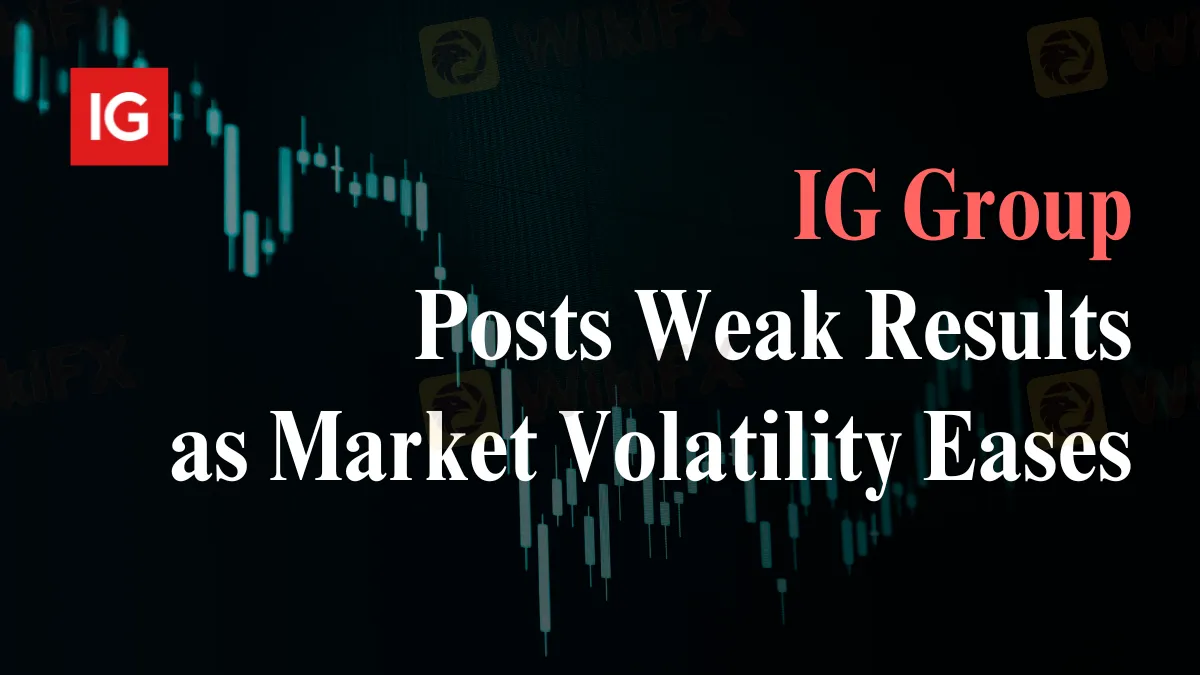简体中文
繁體中文
English
Pусский
日本語
ภาษาไทย
Tiếng Việt
Bahasa Indonesia
Español
हिन्दी
Filippiiniläinen
Français
Deutsch
Português
Türkçe
한국어
العربية
IG Group Posts Weak Results as Market Volatility Eases
Abstract:IG Group reports declining financial performance amidst stable market conditions. Revenue falls, but interest income rises. Strategic cuts and new leadership aim for future growth.

IG Group, a leading spread betting and CFDs broker, has announced its financial results for the fiscal year ending May 31, 2024. The study shows a reduction in performance compared to the previous year, which may be ascribed to weak market circumstances.
Total sales for FY 2024 declined by 3% to £987.3 million from £1,022.6 million in FY23. This decline was caused by a 10% fall in net trading revenue, which decreased to £844.9 million due to reduced trading activity amid lower market volatility across asset classes.
In contrast, the business recorded a significant rise in net interest income, which reached £142.4 million from £80.8 million the previous year. Higher interest rates in all markets contributed to this growth.
Adjusted profit before tax fell 7% to £456.3 million, with a margin in the mid-to-high 40s of 46.2%. Statutory profit before tax fell by 11%, reaching £400.8 million.

Despite these financial issues, IG Group reported a total capital return of £422.7 million, which included dividends and share repurchases, up from £363.4 million in FY23. The business recommended a 46.2 percent total dividend per share and announced a fresh £150 million share repurchase program, which would be completed by January 31, 2025.
Looking forward to FY25, IG Group expects a net operating income of £320-360 million on a £225 million cost basis. During the period, the business saw a slowing of new customer acquisitions, consistent with forecasts given the less volatile market circumstances. The number of active customers declined to 296,300 from 312,000 in the year's first half.
Operationally, IG Group announced intentions to cut its staff by around 300 positions, accounting for roughly 10% of its workforce as of the end of FY24. This restructuring program seeks to create structural savings of £10 million in 2024, which will increase to £40 million in 2025 and £50 million in 2026. Furthermore, variable expenses for 2024 are forecast to fall by an additional £10 million due to the continuous weak market circumstances witnessed since the first quarter.
In a strategic move, IG Group named Breon Corcoran CEO on January 29, 2024. In response to his appointment, Corcoran underlined the need for adaptability in a competitive industrial context. He identified targets for improving customer attention, accelerating product development, and cultivating a culture of ownership and responsibility inside the organization.
As IG Group navigates these financial hurdles, the business remains focused on adjusting to changing market dynamics and preparing for long-term success.
For you IG news, you may visit the IG page here.

Disclaimer:
The views in this article only represent the author's personal views, and do not constitute investment advice on this platform. This platform does not guarantee the accuracy, completeness and timeliness of the information in the article, and will not be liable for any loss caused by the use of or reliance on the information in the article.
Read more

WikiEXPO Global Expert Interview: Simone Martin—— Exploring Financial Regulation Change
In the midst of financial innovation and regulation, WikiGlobal, the organizer of WikiEXPO, stays abreast of industry trends and conducts a series of insightful and distinctive interviews on pivotal topics. We are delighted to have the privilege of inviting Simone Martin for an in-depth conversation this time.

MultiBank Group Wins Big at Traders Fair Hong Kong 2024
Discover how MultiBank Group, a global leader in financial derivatives, secured three prestigious awards at Traders Fair Hong Kong 2024, highlighting its innovative trading solutions and industry excellence.

CySEC Settles Compliance Case with Fxview Operator Charlgate Ltd
Discover how CySEC resolved compliance issues with Charlgate Ltd, the operator of Fxview, through a €50,000 settlement. Explore the investigation, regulatory measures, and CySEC's new website designed for improved accessibility and transparency.

TradingView Launches Liquidity Analysis Tool DEX Screener
Discover TradingView's DEX Screener, a powerful tool for analyzing decentralized exchange trading pairs. Access metrics like liquidity, trading volume, and FDV to make smarter, data-driven trading decisions.
WikiFX Broker
Latest News
CFI Partners with MI Cape Town, Cricket Team
Doo Financial Expands Reach with Indonesian Regulatory Licenses
Volkswagen agrees deal to avoid Germany plant closures
Geopolitical Events: What They Are & Their Impact?
Webull Canada Expands Options Trading to TFSAs and RRSPs
CySEC Launches Redesigned Website Packed with New Features
WikiEXPO Global Expert Interview: Simone Martin—— Exploring Financial Regulation Change
TradingView Launches Liquidity Analysis Tool DEX Screener
MultiBank Group Wins Big at Traders Fair Hong Kong 2024
WikiFX Review: Is PU Prime a decent broker?
Currency Calculator


